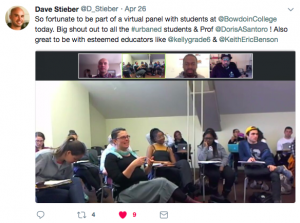Introduction
Before taking Community Organizing and Urban Education (referred to as Urban Ed) in Spring 2018, I had little-to-no conception of what community organizing was and only slight knowledge on urban education from my time interning for a charter school in Washington, DC. Now, after a semester’s worth of discussions and readings I have come to the conclusion that community organizing is a dynamic and complicated pursuit. Additionally, I have learned more about the roles of philanthrocapitalism, race, teachers, and standardized testing in urban schools. I have learned why community organizing is important for unheard populations and necessary in urban areas.
An integral part of Urban Ed this semester was the incorporation of Twitter into our class discussions. Being able to engage in an online dialogue with classmates about our readings and class discussions was a great way to gain insight into how modern day community organizing is achieved.

Found on Barack Obama’s Twitter account @BarackObama
As seen with the recent March for Our Lives movement, which primarily organized on Twitter and has 397k followers, social media platforms are where contemporary movements rally and gain momentum. So, in spirit of Twitter’s integral position in educational activism and community organizing, I have organized parts of my reflection around some of my favorite tweets from the semester (find me @CaitlinLoi).
On Urban Ed: A Mini Twitter Synthesis
From reading the works of John Dewey and Barack Obama early in the semester, I discovered that the means by which a group gains momentum and influence is of utmost importance. When community members get together to build a grassroots organization their efforts inherently make their issue of focus more pertinent. Bringing issues and discontent to the forefront is how change progresses.

Found on Caitlin Loi’s Twitter account @CaitlinLoi
Further, I learned that it is just plain important for people to stand up and advocate for themselves. Nothing significant gets done by well wishing.

Found on Caitlin Loi’s Twitter account @CaitlinLoi
When communities organize to fight against Zero Tolerance Behavior Policies, excessive standardized testing, or for LGBTQ+ students’ equality progress is made.

Found on Caitlin Loi’s Twitter account @CaitlinLoi
Additionally, the role of leaders, of community organizers, is important when thinking about sustaining a grassroots organization or movement. Ella Baker, a prominent community organizer of the 20th century, argued that a leader should be a facilitator, one who engages with the population they are leading. Throughout this course I have learned that a community organizing leader is more than just a delegator. More accurately, a community organizing leader:
- Provokes communities until they see organizing as necessary;
- Illuminates significant issues worth organizing around;
- Asks questions;
- Supports collaboration;
- Encourages dialogue; and
- Is flexible in the process of achieving the group’s goal.

Found on Caitlin Loi’s Twitter account @CaitlinLoi
In sum, cooperation and learning are key to successful, effective community organizing. Parents must work with students who must work with teachers who must work with the community – it all comes full circle.
On Chicago & Grassroots Organizing
As expected, while conducting research for this website I learned more deeply about the problem of neighborhood violence, particularly in urban areas, and its affects on students and their learning. I knew that violence was a problem in Chicago, but I did not know how severely violence affected the personal lives of students and teachers.
I was particularly moved by the way Dave Stieber, a Chicago Public School (CPS) teacher, answered my question during his call-in with Urban Ed.

Found on Dave Stieber’s Twitter account @D_Stieber
My question for Dave: How does the neighborhood violence in Chicago affect your classroom?
His answer: Violence affects his classroom more than he would like to admit. He had just attended a large debriefing/meeting of CPS teachers during which they had to reflect on the amount of students each had lost to gun violence. Dave almost teared up while answering my question. The severe emotional trauma experienced by students, teachers, and parents alike is one of many brutal effects of neighborhood violence in Chicago. No wonder there are so many grassroots organizations involved in combating the violence.
On Hope
I am inspired by the students of color, empowered residents, concerned parents, and working families who engage in grassroots organizing. Being brave enough to fight for equality, safety, and so many other rights is beyond impressive. I plan to continue finding and following involved teachers and budding grassroots organizations. They give me hope, and as discussed on the final class of Urban Ed, hope keeps people and movements going strong.
